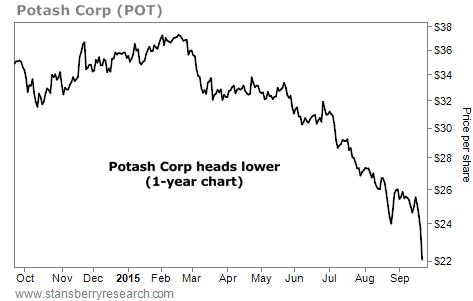| Home | About Us | Resources | Archive | Free Reports | Market Window |
Why I'm Thrilled Stocks Are CrashingBy
Wednesday, September 23, 2015
I'm praying for another couple of months like August in the stock market.
The S&P 500 fell 6% from August 17 to August 31 – dropping as much as 11% at the bottom. August 24 was the best day for rational investors, with all the big stock indexes down 4% in a single trading session.
One colleague forwarded me a news article saying that the culprits on August 24 were big, computerized stock-trading firms all selling at once.
When markets fall a little, those big computers are programmed to sell a lot. Every now and then, all the computer-driven traders find themselves doing the same thing. And the mass selling creates days like August 24.
Or so they tell me. Who knows what those money-managing computer geniuses are really up to. But if the article is right, I pray they don't change what they're doing...
According to Dominique Dassault of GlobalSlant, all these computer models will blow up one day.
In her June 19 blog post, Dassault wrote (emphasis added)...
The "degrading model" refers to the computer models used by sophisticated (but blow-up-able) trading firms. With any luck, those firms will do business as usual for another couple months, and stocks will fall even more. You see, when know-nothings – sophisticated and otherwise – blow themselves up, it's great for you and me. Forced selling unrelated to fundamental value is one of the all-time great setups for big returns in publicly traded securities. That's what happened on August 24 (or so we're told).
Remember, no matter how much trading is done by computers, stocks aren't lottery tickets. They're fractional ownership interests in real businesses, run by real people.
As far as I'm concerned... cry havoc, and let slip the blowups!
Falling markets are good because they make stocks cheap enough to recommend buying.
If the computer models (or whoever) keep selling and the S&P 500 falls 20% from its May 20 high (2,132), the words "bear market" and "volatility" will be published online dozens of times per hour and repeated 100 times a day by every talking head on CNBC and Fox Business News.
This will make many great businesses trade for cheaper prices – which, as regular readers know, is the strategy we use in Extreme Value.
Bottom line: Don't be afraid of the stock market. Be ready to exploit it when everyone else is acting irrationally.
Good investing,
Dan Ferris
Further Reading:
"Owning great businesses at good prices allows you to do something you're not supposed to be able to do," Dan writes. "It allows you to beat the market with less risk..." Learn more about the power of buying the world's best businesses at good prices here: Our Strategy Beats the Market With Less Risk.
For the past several years, Dan has urged his readers to buy world-class businesses. These businesses gush free cash flow, reward shareholders, have great balance sheets, earn consistent profit margins, and have high returns on equity.
Market NotesAN UPDATE ON THE POTASH INDUSTRY Today, we're checking in on the potash industry... and things don't look pretty.
You can see this by looking at Potash Corp (POT). The company is the world's largest fertilizer producer by total capacity. It has nearly 20% of global potash capacity... and owns more potash mines than any other company. But POT has faced some major headwinds over the past couple of years.
Potash (the fertilizer) prices are down more than 30% from their 2011 peak. The collapse was caused by increased supply from large Russian and Belarusian producers that broke the global potash cartel in 2013 (this cartel had previously helped keep prices artificially high).
On top of that, competitors are expected to continue increasing their production in the coming years, and new competitors are entering the market in North America. And demand from China, the world's largest fertilizer buyer, is slowing.
As you can see below, Potash Corp shares have suffered as a result. They're trading at their lowest level since the 2008 financial crisis, and are down more than 30% in the past four months alone. According to Potash Corp, the industry is still in a bear market.
 |
Recent Articles
|



